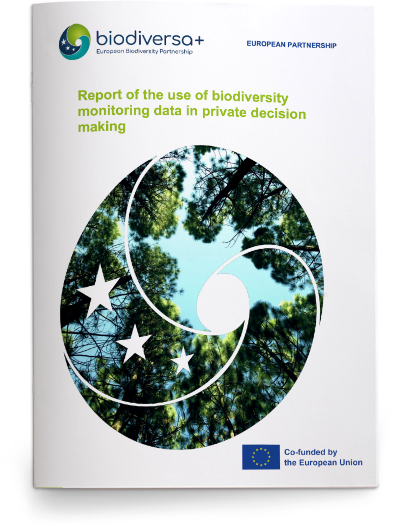“Report of the use of biodiversity monitoring data in private decision making”
Biodiversa+ organised a workshop on 8 November 2022 to focus on the use of biodiversity monitoring data by private sector actors. This event was part of Biodiversa+’s wider effort to support and reinforce the use of biodiversity data in both public and private decision-making. The aim was to understand the private sector’s needs for this data and explore how Biodiversa+ could help overcome existing challenges.
The workshop was strategically held back-to-back with the annual EuropaBON conference, facilitating a wider mobilisation of stakeholders. Attendees included participants from various organisations across Europe, such as NGOs, research bodies, multinational companies, and notably, a significant proportion of Small and Medium-sized Enterprises (SMEs).
A pre-workshop survey revealed that participants most frequently used data related to direct or indirect pressures on biodiversity, species population data, and ecosystem functioning data. A key finding was that two-thirds of respondents needed additional data they currently could not access. Specific data needs identified included more precise data on EU Habitats, easy-to-use biodiversity indicators for SMEs, and accurate geographical distribution data at appropriate scales. Most respondents were found to be both users and providers of biodiversity data.
The workshop focused on identifying factors facilitating (assets) and hindering (barriers) the use and sharing of biodiversity data by the private sector, specifically to support decision making.
- Key identified assets for data use included standardisation, platforms like GBIF, new EU reporting obligations (like the Green Deal), and growing awareness. For data provision, assets included the trend towards open data, financial incentives, and facilitating sharing through standards.
- Significant barriers to data use highlighted were fragmentation of tools, data quality/reliability, data not being available at relevant scales, missing metadata, and data gaps. For data provision, major barriers identified included lack of incentives, intellectual property issues, data being in different formats, and lack of awareness for available tools and standards. A frequently discussed barrier across both use and provision was the perception of risk, encompassing concerns about sharing data they paid for, potential liability from incorrect sharing, corporate espionage, and increased legal risks or restrictions on activities if sensitive data is exposed.
- The workshop proposed actions to address four key barrier clusters: lack of accessibility/availability/findability, lack of resources, lack of standardisation and actionability, and lack of incentives. Proposed steps included demonstrating the benefits of FAIR data, encouraging sharing via a single access point like GBIF, ensuring tailored training, governments creating incentives, and providing guidance on data use and generation.
Biodiversa+ was seen as having a role in facilitating stakeholder interactions, providing guidance on standards, mobilising national actors, and securing funding. Future activities could focus on the metrics currently used by businesses and how they might be aligned. Exploring the concept of Essential Biodiversity Variables (EBVs) for the private sector and linking data used for life cycle assessments to the EU Taxonomy debate were also suggested. The key takeaway was a clear need for guidance and capacity building, a role Biodiversa+ is well-positioned to fulfil.
